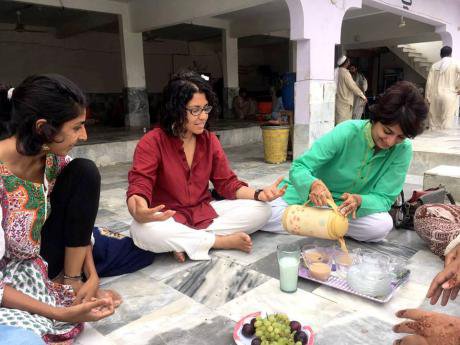From claiming their space at male-dominated street-side dhabas to now opening a dhaba of their own, Pakistan’s Girls at Dhabas movement has made significant progress. Recently, they asked their steadily increasing pool of well-wishers for financial support to help them set up their adhaban.
The aim of the movement, spearheaded by a group of young women in Karachi, is to enable women who are deterred by concerns for their safety to visit public spaces. The dhaba that the group aims to set up through crowdfunding will not only be a safe space for them but also be run by women.
One of the movement’s founders, Natasha, told Images that they hope to open the dhaba in a central location that is easily accessible and all-inclusive.
A dhaba and then some
During the traditional dhabas focus on serving customers tea and edibles that are light on the pocket, Girls at Dhabas want their dhaba to be more than that.
“We imagine it as a community space and tea shop,” Natasha elaborates. “It will be modeled after the Khanabadosh Writer’s Cafe in Hyderabad. A feminist hub [that encompasses] dialogue, workshops, a motorcycling club for women, formalized street cricket for girls and more activities around our activism. We want to make a small dent in Karachi’s male-dominated public space — a pocket of oxygen that is inclusive, safe and welcoming for women and minorities who want to be able to chill on the streets and have a (cheap) cup of chai,”
She adds that books will also be found at their dhaba.
Men allowed
Given the widespread misperception that feminists are somehow anti-men, the Girls at Dhaba movement is making sure not to contribute to that narrative. Instead, they will counter it by welcoming men into their dhaba.
While some believe that the dhaba may reinforce the segregation of women from men, Natasha stresses that women are systematically excluded from public spaces. This dhaba will allow them to reclaim their space alongside men, who are welcome at the dhaba too.
However, men will not be employed at the dhaba. “We will employ gender minorities, which includes women and khwajasira (transgender) staff,” Natasha said. This will be another effort to re-integrate the marginalisedkhwajasira community into society.
Are people willing to donate to a dhaba?
From their near full-house dhaba meet-ups to well-attended Galli cricket matches to sessions at educational institutions, the community has received an overwhelming response from young women and girls; many men have also shown their support by endorsing the campaign. However, the question remains, are people willing to contribute financially to the novel campaign?
It appears some do. Natasha shares that funding has gradually trickled in from some individuals: “Regarding our crowdfunding campaign, we have raised 40% of our target and are counting on the people who believe in this work to help us meet the rest before November 26.”
“International organizations have approached us to fund [our project], but we want to be able to [decline their offer] as we want this to be an independent, community-led initiative, as opposed to another hierarchical, top-down one.”
“If you would like to imagine a more inclusive society for the women of Pakistan, then you need to support this cause. The absence of women from Pakistan’s public spaces represents their systemic exclusion from social and fully human existence. It indicates how overwhelmingly patriarchal our society has become and thus needs to be actively resisted, which is what we are trying to do through our work,” Natasha added.
Contributors to their campaign enjoy perks such as getting a food item named after them (for the most generous donor), stickers, T-shirts and, of course, chai!






